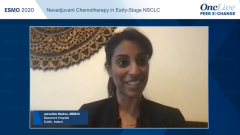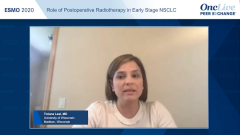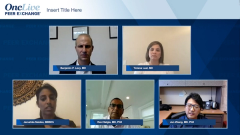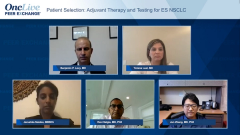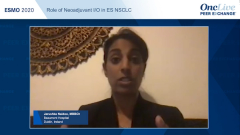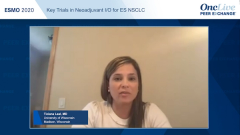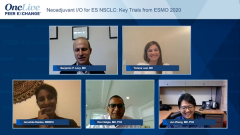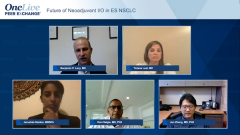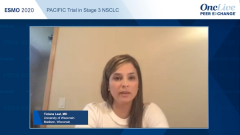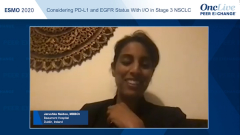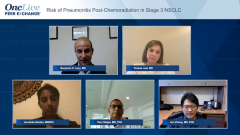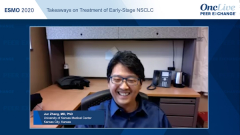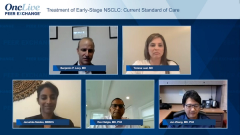
Treatment of Early-Stage NSCLC: Current Standard of Care
Episodes in this series

Benjamin P. Levy, MD: Hello, and welcome to this OncLive® Peer Exchange® titled “Updates in Systemic Therapy for Nonmetastatic Lung Cancer.” I’m Dr Benjamin Levy from Sidney Kimmel Comprehensive Cancer Center at Johns Hopkins University, primarily out of Sibley Memorial Hospital in Washington, DC. I’m thrilled to be joined by an expert panel of faculty. First, Dr Ticiana Leal, from the University of Wisconsin–Madison. We are also joined by Dr Jarushka Naidoo, who recently moved across the pond. Dr Naidoo is a consultant thoracic medical oncologist at Beaumont Hospital in Dublin, Ireland. Also joining us is Dr Ravi Salgia, from the City of Hope Comprehensive Cancer Center in California; and Dr Jun Zhang, from the University of Kansas in Kansas City.
Today we’re going to discuss a number of topics pertaining to stage I through stage III in non–small cell lung cancer, including adjuvant EGFR TKIs [tyrosine kinase inhibitors]; perioperative immunotherapy, with a focus on neoadjuvant immunotherapy; and consolidation immunotherapy in stage III non–small cell lung cancer. We’ll discuss the latest research in the field and the impact of recent clinical trials on making decisions around treatment selection. Let’s get started on our first topic.
You can’t have a panel discussion or a committee meeting or a Zoom panel discussion without talking about ADAURA, which has recently been presented on and is now published. Although not FDA approved yet, this is clearly practice changing. But before we talk about ADAURA and the role of adjuvant osimertinib for resected EGFR-mutant lung cancer, perhaps we can go over general treatment approaches for patients with resected early stage lung cancer.
Dr Zhang, do you want to kind of walk us through what your approach is for patients with resected early stage lung cancer? What do you talk to them about? Walk us through your conversation with them when they come to your office.
Jun Zhang, MD, PhD: Sure. So the focus of the resected early stage non–small cell lung cancer at this moment is primarily on folks in the adjuvant setting. We offer adjuvant chemotherapy for stage II and stage III disease, as well as for those of selected high-risk stage IB disease, such as those with a tumor larger than 4 cm. There is also a consideration for radiation therapy for patients who have a positive surgical margin. Now, for N2 disease, however, this is debatable. At this moment, I would say it is generally recommended, but we know that the data are not solid. In fact, the recent data from ESMO [European Society for Medical Oncology Congress], the most recent data from LUNG ART may potentially change our practice.
In addition, based on the data from ADAURA, if a patient has an EGFR mutation, we should seriously consider osimertinib for patients with stage IB, II/IIIA disease.
Benjamin P. Levy, MD: That’s a great overview. Dr Leal, how do you talk to patients? What chemotherapy are you generally using for these patients? Is it carboplatin? Is it cisplatin? What’s your partner there for patients with resected non–small cell lung cancer?
Ticiana Leal, MD: For patients with early stage resected non–small cell lung cancer with generally stage II or stage III disease, and select patients with stage IB disease with larger tumors greater than 4 cm, we’ll talk about the role of adjuvant chemotherapy with regard to risk reduction or recurrence as well as overall survival. In general, my preference, based on the results of randomized trials and the meta-analysis, is to use a cisplatin-based regimen. For patients with a good performance status, good renal function, with nonsquamous histology, who are motivated to go through 4 cycles of adjuvant chemotherapy, I discuss the roll of cisplatin in combination with pemetrexed.
For the squamous population, we use cisplatin. The partner would be either docetaxel or gemcitabine. We talk about risk reduction and the 5-year overall survival benefit that is modest—in the order of 5%. There is probably more of a benefit in the population with nodal positivity. We do have that discussion about toxicity and quality of life. It depends on the patient’s goals as well.
Benjamin P. Levy, MD: Dr Naidoo, do you ever offer carboplatin as adjuvant therapy? What’s that patient look like? You know, cisplatin is not the easiest to get through. We’re trying to do 4 cycles of a platinum-based regimen. Usually, the data are with cisplatin. Are there data, or do we ever consider using carboplatin for patients?
Jarushka Naidoo, MBBCh: I certainly do. Of course, this is an extrapolation of the data in stage IV disease. Dr Joan Schiller’s paper in the New England Journal of Medicine showed that all our platinum-based chemotherapies have overlapping survival curves in the stage IV setting, in terms of outcomes. I think it’s safe enough to extrapolate that in this setting. Carboplatin and Taxol is a very reasonable approach for patients who may have a borderline performance status. It is also a reasonable option if, for some reason, you feel that a cisplatin-based regimen may not be appropriate. For example, renal impairment.
Obviously, the data that all our adjuvant approaches are based on pertain to cisplatin and vinorelbine. I know of some sticklers who still give cisplatin and vinorelbine. So there are a lot of options, in terms of chemotherapy, in the adjuvant setting. A histology-based approach such as what Dr Leal outlined is very reasonable. The classic cisplatin-vinorelbine regimen is also an option, as well as carboplatin-paclitaxel.
Benjamin P. Levy, MD: Dr Salgia, what is your general approach in the adjuvant setting? What do you select as chemotherapy? How do you discuss this with patients? Is there anything you want to add?
Ravi Salgia, MD, PhD: You know, it’s a multidisciplinary effort, right? We talk about every patient, and it becomes much more personalized. If they qualify for a clinical trial, that’s what we tend to consider first, in that sense. But you really have to think about that patient population. You think about managing an older population. You think about how to manage the poor performance status population. You consider the achievement of having an overall survival. Really, it’s individualized. It’s stage based, performance status based, molecular analysis based—all those are factors to consider.
Benjamin P. Levy, MD: Yeah, all your points are well received and nicely summarized. One thing I would add is that I tell patients, “We’re going to try to give 4 cycles of adjuvant cisplatin-based chemotherapy.” Patients are under the assumption, “If I get 4 cycles and I’m in the clear, there’s no chance of recurrence.”
We have to have to have this balanced discussion that the benefit is there. It’s modest in some patients. It’s worth it for many of our patients. But I try to go over that benefit. You have anywhere from a 5% to 15%, maybe 20% improvement, and a 5-year survival with the use of adjuvant chemotherapy. Unfortunately, there is the chance of recurrence. This will lead in nicely to our discussion on the ADAURA data.
Transcript Edited for Clarity


